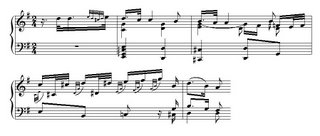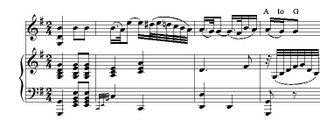Woke up groggy on a beautiful morning to find that Gyorgy Ligeti has passed away. On top of this sad news, I think it unfortunate that the AP headline reads, essentially, “Space Odyssey Composer Dies.” We are no longer free creatures, my friends, we are all subjugates of the vast cinematic dictatorship, and only insofar as our activities pertain to movies (preferably Oscar-nominated ones) do they possess any true importance. Cinematism?
Just a couple posts ago I noted my amusement (somewhat repressed) at a (deliberately) absurd harmonica conclusion to the Lamento of the Ligeti Piano Concerto. I have more complicated feelings about the composer’s work as a whole … why must our feelings about composers go through phases, like relationships? Indulgent nostalgia: a boiling hot summer in Bloomington, Indiana, in the early 90s, with mornings and afternoons spent ascetically in an ice-cold, over-airconditioned practice cubicle on a totally unsatisfactory piano, trying to pound several of the Etudes into my memory banks. For everyone else, it was barbecues and lake outings, but NO, I had to learn my “Automne a Varsovie.” (Self-pity meter off charts.) And just a year or so ago, I found myself pounding those same notes back into my head: just as beautiful, elusive, shifting and maddening. Man, at least this man, wishes to be machine briefly to execute more perfectly these things, these devised inexplicable contraptions, which then become challenging pleasures for man (how can machines take pleasure from them?). Is it catty to say that many (most) of the existing recordings seem to leave for the realm of machine and don’t make it back, roundtrip, to human-land; that in their quest for perfection and execution they forget the humorous, joyous glint? I did not know him personally; from many accounts, he was not always humorous in person; but the music to me radiates the joy of the intellect combined with just enough (not too much) sensual pleasure, making a perfect cocktail, somewhat astringent, not an “umbrella drink” as so many compositions are these days. I’m still waiting for the recording which feels like a joyous, but mindful release. Let’s not forget first impressions: the 20-year-old Jeremy thought they were “cool.” True: the Etudes shimmer with coolness, both in the sense of restraint and The Hip. And then, they are also outrageous, over the top, demanding of the impossible, and engaging of the dance rhythm to the end of the mind’s range, an orgy of rhythmic complication … Oh I could go on and on. Rest in peace. The angels or demons, or whoever they are where he is now, had better be able to count.






